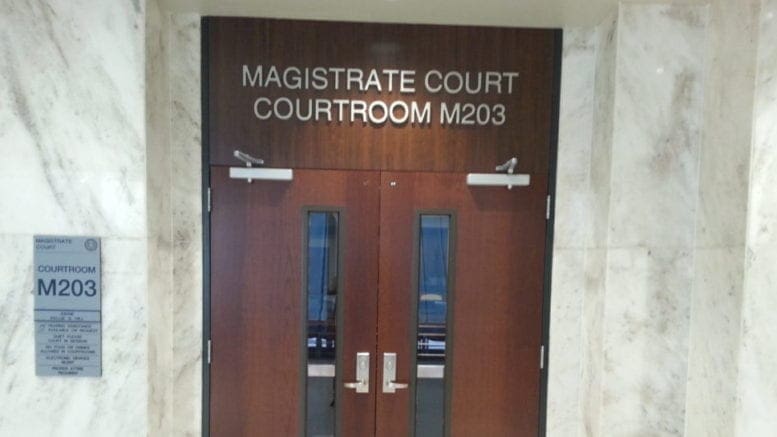Cobb County Magistrate Court and the Center for Family Resources will run a new accountability court called the Housing Stability Court.
While Cobb’s other accountability courts, administered by Superior Court, are set up to provide an alternative to incarceration, the new court is intended to provide an alternative to eviction.
The Cobb County Board of Commissioners approved funding for the new project.
“We’re incredibly excited about the program. We’ve been charged with bridging the gap to the future,” said Cobb’s Chief Magistrate Brendan Murphy. “This will bring resources to bear so folks can lift their families to a better situation.”
According to the county’s news release about the project:
“The program will be funded from a $1.3 million federal Emergency Rental Assistance (ERA) allocation, which can only be used for rental and mortgage assistance.
“The court wanted to wait until the ERA funds designated for direct assistance were exhausted before starting the program. The county received more than $23 million from the federal government for housing assistance during the pandemic.
“The Magistrate Court will work with the Marietta-based Center for Family Resources to administer the program. Participants will be referred to the Housing Stability Court, and there is no mechanism for people to apply to the program directly.
“The unique court program will help families avoid losing their homes by providing small monetary assistance combined with wrap-around services to work with landlords and tenants to avoid the eviction process” [Editor’s note: an earlier version of this story identified the ERA grant as $760k. We regret the error]
During the pandemic the Magistrate Court launched multiple initiatives aimed at slowing down, if not stopping, the wave of evictions expected in the economic wake of the crisis.
About the Accountability Courts
Materials distributed by Cobb County Superior Court describe Cobb’s four accountability courts as follows:
“Cobb Superior Court has four such courts: Drug Treatment Court, which includes both regular and intermediate tracks; Veterans Accountability and Treatment Court; Mental Health Court; and Parental Accountability Court. Various county and state offices collaborate with the judges and staff in operating individual accountability courts.”
The purpose of the accountability court program is to provide an alternative to incarceration for individuals who need counseling and treatment rather than punishment.
Drug Treatment Court
The website for the Drug Treat Court describes the program and its two tracks as follows:
“Drug Treatment Court is an accountability court designed to manage individuals with substance addiction by providing an alternative to the traditional justice system.
“The Court Is designed to improve the health of our participants, not only by addressing the immediate symptoms of their addiction but also orienting participants to a new way of healthier living which can be continued for the rest of their life.
“The Cobb County Drug Treatment Court offers two programs.
“The regular track is an 18- to 24-month program, dealing with high-risk, high-need participants.
“The Intermediate track is a 12- to 18-month program for participants diagnosed with a mild to moderate substance use disorder and deemed a lower risk of re-offending. A risk-needs-responsivity assessment is completed to determine participant placement.”
Mental Health Court
The website for the Mental Health Court describes that court and its mission as follows:
“Mental Health Court is a 24 month minimum, voluntary, pre or post-plea, judicially supervised, treatment-based program for those individuals with a documented mental health diagnosis.
“The Cobb County Mental Health Court strives to improve mental health, promote self sufficiency, reduce recidivism, and offer cost effective alternatives to incarceration and hospitalization.
“A Mental Health Court represents an effort to increase effective cooperation between two systems that have traditionally not worked closely together – The Mental Health System and The Criminal Justice System.
“The program will hold participants accountable while assisting them in achieving long term stability, becoming successful family/community members, and remain law abiding citizens.”
Veterans Accountability and Treatment Court
The Veterans Accountability and Treatment Court website describes that court as follows:
“Cobb County Veterans Accountability and Treatment Court (VATC) seeks to divert eligible veteran defendants with substance dependency and/or mental illness that are charged with criminal offenses, to a specialized criminal court.
“The court substitutes a treatment problem solving model for traditional court processing.
“The veterans voluntarily participate in a judicially supervised treatment plan that a team of court staff, veteran health care professionals, veteran peer mentors, and health care professionals develop with the veteran.
“At regular status hearings, treatment plans and other conditions are periodically reviewed for appropriateness, incentives are offered to reward adherence to court conditions, and sanctions for non-adherence are handed down.”
Parental Accountability Court
The website for the Parental Accountability Court describes its purpose as follows:
“PAC seeks to address underlying issues that make it difficult for non-custodial parents to pay child support while providing judges with an alternative to incarceration in civil contempt cases.
“The program uses a team approach to meet participants’ needs as they become more accountable for supporting their children.
“Members of the Parental Accountability Court Team include the Judge, Special Assistant Attorney General (SAAG), Parental Accountability Court Coordinator (PAC-C) from the Georgia Department of Human Services (DHS), Division of Child Support Services (DCSS), DCSS local Office Manager, and representative(s) from the Cobb County Community Services Board (CSB).”
For more detailed information about the accountability courts visit this link to the Superior Court’s Accountability Court website and explore the specific programs you are interested in learning about.
